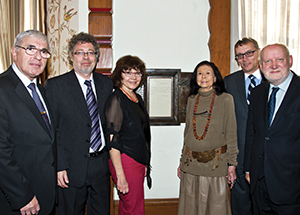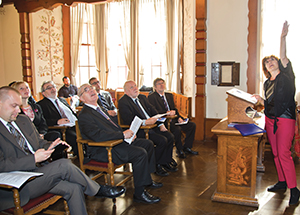Czech Delegation Learns About Special Ties That Bind a Young Czechoslovakia to Pitt
Voices filled the University of Pittsburgh’s Czechoslovak Nationality Room as a delegation from the Czech Republic filed into Room 113 one recent Friday morning. The group was nearing the end of a five-day visit to the Pittsburgh region that included an anniversary celebration of the 1918 Pittsburgh Agreement, which paved the way to an independent Czechoslovak nation.
But these voices did not emanate from the Czech business people, the Czech Senate president, or other dignitaries who comprised the 20-member delegation. Instead, these were symbolic voices—voices of history. And they relayed the stories of the Czechoslovak leaders whose portraits are painted on the room’s ceiling; of the Czechs and Slovaks—many of them farmers, reflected in the room’s Slovak farmhouse theme—who loved their homeland; and of the uncanny connections that the small nation with a very turbulent history shared with the University of Pittsburgh.
E. Maxine Bruhns, director of Pitt’s Nationality Rooms and Intercultural Exchange Programs, graciously welcomed her guests on this Oct. 18 morning. Together with Maryann Sivak, Bruhns’ assistant who is fluent in Czech, the two women presented the Czechoslovak Nationality Room’s history in the context of world history … and the voices took flight.
It is appropriate that a bronze relief of Tomáš Masaryk rests prominently above the blackboard in the front of the Czechoslovak Nationality Room. Honored as the Father of the Nation by the Czechs, Masaryk and his family had strong ties to Pittsburgh, including personal relationships with former Pitt Chancellor John Bowman and Pitt Nationality Rooms founder Ruth Crawford Mitchell. The Masaryk family also played an important role in the realization of the Czechoslovak Nationality Room itself.
Masaryk was a beloved professor, philosopher, and politician who led the movement to create an independent Czechoslovak nation from World War I’s crumbling Austro-Hungarian Empire. He presided over an enormous rally of about 20,000 Slovak- and Czech-Americans in Downtown Pittsburgh on May 30, 1918, to gain support for the Pittsburgh Agreement’s ideals—and he became the new Czechoslovakia’s first president in 1918.
Masaryk’s oldest child, Alice Masaryk, became president of the Czechoslovakia Red Cross—and received an honorary degree from Pitt Chancellor Bowman in 1939 that enabled her escape from Czechoslovakia when Hitler invaded that same year. She also developed a deep friendship with Ruth Crawford Mitchell, predecessor to Nationality Rooms Director Bruhns—and ended up serving as the Prague-based chair of the Czechoslovak Nationality Room Committee in the early 1920s.
Maryann Sivak, the assistant to Bruhns and a former secretary of the Czechoslovak Nationality Room Committee, spoke about the Nationality Room’s history as the Czech delegates sat attentively in the room’s solid oak and red-leather chairs. A Slovak whose family moved to what is now the Czech Republic when she was 5 years old, Sivak described how Tomáš Masaryk’s brother, Jan, traveled to Pittsburgh for the Czechoslovak Nationality Room dedication on March 7, 1939—one week before the German occupation of Prague.
Sivak relayed how Jan Masaryk, who was then Czechoslovakia’s foreign minister, spoke to a large crowd in the Cathedral’s Commons Room. But she faltered when she began reading his expressions of hope from that morning in 1939:
“….how proud I was this morning to walk into this Cathedral of Learning, where I have seen rooms belonging to many nations and where I saw proud American children of parentage of these countries, imbibing in the free unbiased truth of learning. I am going to pray to God that Europe, someday, will be like that—that we will be men and women of this or the other nationality or parentage or race or creed, but working together for the common good of ourselves and those who come after us.”
Wiping away tears, Sivak asked the Czech delegation’s interpreter to finish reading Jan Masaryk’s comments.
“This is a very emotional room,” Bruhns explained quietly to her guests—all of whom understood and nodded.
Later, it was time for the Czech delegation to move on to a lunch hosted in their honor at Alumni Hall. They gathered around Bruhns in the Commons Room, where she proudly described how Pitt’s Nationality Rooms Program began, at the urging of then-Chancellor Bowman. Pitt students, meanwhile, were studying at nearby tables, and classes were being held in many of the Nationality Rooms on the Cathedral’s first and third floors. Seventy-four years after Jan Masaryk spoke in the Commons Room, the voices of history can still be heard. In these rooms “belonging to many nations … proud American children of parentage of these countries [are] imbibing in the free unbiased truth of learning.”
Other Stories From This Issue
On the Freedom Road

Follow a group of Pitt students on the Returning to the Roots of Civil Rights bus tour, a nine-day, 2,300-mile journey crisscrossing five states.
Day 1: The Awakening
Day 2: Deep Impressions
Day 3: Music, Montgomery, and More
Day 4: Looking Back, Looking Forward
Day 5: Learning to Remember
Day 6: The Mountaintop
Day 7: Slavery and Beyond
Day 8: Lessons to Bring Home
Day 9: Final Lessons

